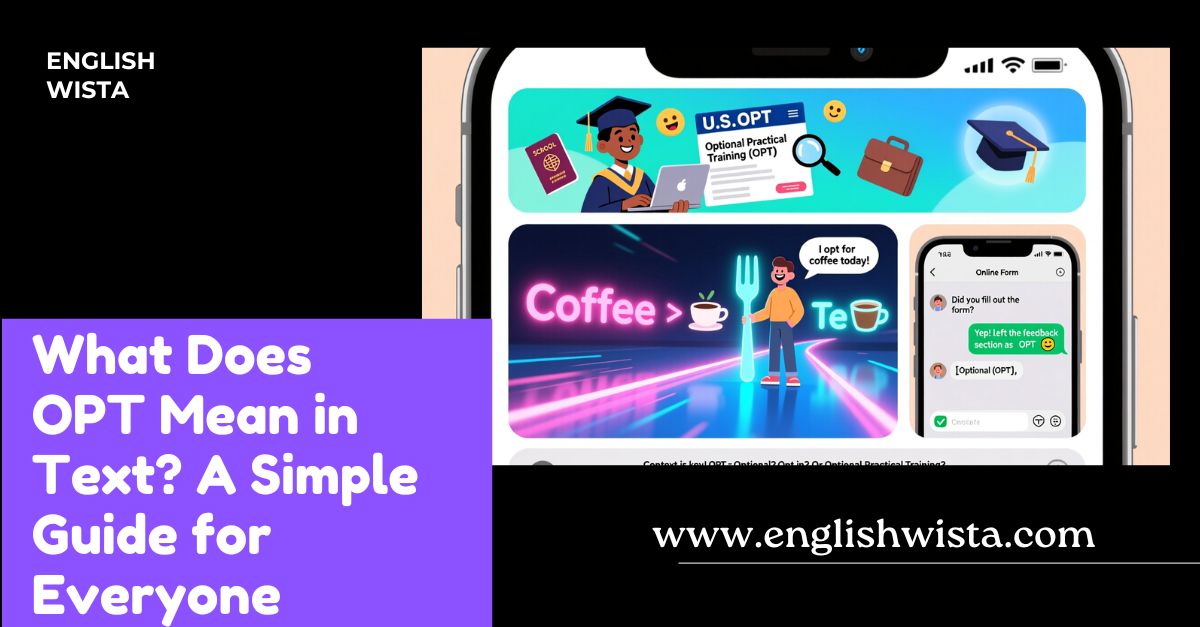Have you ever been scrolling through messages or online chats and suddenly seen the word “OPT” pop up? Maybe it left you scratching your head, wondering if you missed some new internet slang trend. Don’t worry you’re not alone. Short forms and abbreviations are everywhere these days, and they can sometimes feel like a secret language.
The good news is that OPT isn’t as complicated as it seems. Depending on where it’s used, it can mean different things, but once you understand the main ideas, it’ll make perfect sense. In this article, we’ll break down what “OPT” means in text, why people use it, and how you can confidently understand it the next time you see it.
Let’s dive in step by step so that by the end, you’ll know exactly how to spot and use “OPT” in everyday communication.
What Does OPT Mean in General?
At its core, OPT is a short form of the word “opt,” which means “to choose” or “to make a decision.”
For example:
- “I’ll opt for pizza tonight instead of burgers.”
- “She opted out of the group project because she was too busy.”
So when you see OPT in text messages, it often carries that same meaning a choice, decision, or option.
But here’s the catch: in texting and online chats, OPT can also stand for other phrases or acronyms. That’s why it sometimes confuses people. The meaning depends on the context.
The Main Meanings of OPT in Text
Here are the most common ways you’ll see OPT used in digital conversations:
1. Opt (as a verb: choose/decide)
This is the most natural meaning. When someone writes “opt” in text, they’re simply talking about choosing something.
Examples:
- Friend 1: “Do you want to go out or stay home?”
- Friend 2: “I’ll opt to stay home tonight.”
- “She opted for the cheaper phone because it had everything she needed.”
In this case, OPT is just the short form of the verb “to opt.”
2. OPT = Optional
Sometimes, especially in online forms, class notes, or casual text reminders, OPT is short for “optional.”
Examples:
- “Snacks are opt, but drinks are included.”
- “Wearing a costume is opt for the party.”
Here, “opt” doesn’t mean a choice you make actively but rather something that’s not required.
3. OPT = Optional Practical Training (U.S. immigration term)
For students in the United States, especially international students, OPT is a very specific acronym: Optional Practical Training.
This refers to a program that allows international students to work in the U.S. after finishing their studies.
Example in conversation:
- Student A: “Are you applying for OPT after graduation?”
- Student B: “Yes, I want to get some work experience before going back home.”
If you see OPT in conversations among college students or professionals, this is often the meaning.
4. OPT = Other Possible Meanings in Text Slang
Sometimes, people might use OPT as slang or a creative shorthand. While not as common, it could appear in casual texting. For example:
- OPT = “One Perfect Thing” (used romantically or positively, but very rare)
- OPT = “On Point Today” (similar to saying someone looks good or is doing great)
Most of the time, though, you’ll only need to remember the first three meanings: choose, optional, or Optional Practical Training.
How Do You Know Which Meaning of OPT Someone Means?
Great question! Since OPT has different meanings, you need to look at context.
Ask yourself:
- Is the person talking about making a choice? Then it means “opt.”
- Is the text about rules, requirements, or forms? Then it likely means “optional.”
- Is the conversation about school, immigration, or work in the U.S.? Then it probably means “Optional Practical Training.”
Example 1:
- Text: “I’ll opt for water instead of soda.”
- Meaning: “choose.”
Example 2:
- Text: “Attendance is opt, but homework is mandatory.”
- Meaning: “optional.”
Example 3:
- Text: “I just got approved for OPT!”
- Meaning: “Optional Practical Training.”
Common Misunderstandings About OPT
Because “OPT” looks like an acronym, people sometimes assume it always stands for something fancy. But remember, sometimes it’s just the regular word “opt” used in a short, casual way.
Another confusion is mixing up OPT with OP (Original Poster or Overpowered), which are common internet abbreviations. They’re not the same.
- OPT → choose, optional, or Optional Practical Training.
- OP → original poster (the person who started a thread) or overpowered (in gaming).
Where Do People Use OPT in Text?
You’re most likely to see OPT in these places:
- Casual texting: When friends are talking about making decisions.
- Online forms: Where it means “optional.”
- Student/immigration chats: Where it means Optional Practical Training.
- Group chats or forums: Sometimes as a shorthand for slang meanings.
Real-Life Examples of OPT in Different Situations
Example 1: Choosing Something
- Text: “I’ll opt for the morning shift instead of the evening.”
- Translation: “I’ll choose the morning shift.”
Example 2: Optional Rule
- Text: “Bringing your own drinks is opt.”
- Translation: “Bringing drinks is optional.”
Example 3: Student Life
- Text: “Have you applied for OPT yet?”
- Translation: “Have you applied for Optional Practical Training?”
Example 4: Slang/Playful Use
- Text: “Her outfit is OPT today.”
- Translation: “Her outfit is on point today.”
The Origin of the Word “Opt”
Here’s a fun fact: The word “opt” comes from the Latin word optare, which means ‘to choose’ or ‘to wish.’
That’s why today, when we say “opt,” we’re really talking about making a choice or selection.
Is OPT Singular or Plural?
This is a common question, but the good news is: “opt” isn’t a noun it’s usually a verb. That means you don’t use it in singular or plural form.
For example:
- Correct: “They opt for tea every morning.”
- Correct: “She opts for coffee.”
- Incorrect: “She has three opts.” (That doesn’t work because “opt” is not a countable noun.)
The only exception is when people casually use “opts” to mean “options,” but that’s not standard English.
Related Words and Phrases
To help you remember better, here are some related words and phrases:
- Option → A choice.
- Optional → Not required.
- Opt in → Agree to participate.
- Opt out → Choose not to participate.
- Opt for → Choose something specific.
Examples:
- “I’ll opt in to the email newsletter.”
- “He opted out of the contest.”
- “She opted for the vegetarian meal.”
Fun Facts About OPT
- The word “option” and “optical” also come from the same Latin root word optare (related to seeing or choosing).
- “Opt” is a favorite word in advertising companies often say things like “Opt for the best!”
- In the digital world, the terms opt-in and opt-out are very important for privacy and marketing.
Quick Recap
Let’s summarize what we’ve learned:
- OPT usually means “to choose” (verb).
- It can also mean “optional” in casual notes or reminders.
- For international students in the U.S., OPT means Optional Practical Training.
- Context is the key to understanding which meaning is correct.
- Related forms include “opt in,” “opt out,” and “opt for.”
Conclusion
So, the next time you see OPT in a text message, online form, or student chat, you won’t feel lost. You’ll know that it could mean someone is choosing something, referring to something optional, or talking about Optional Practical Training.
The important thing is to look at the context. Is the person talking about school? Probably “Optional Practical Training.” Are they talking about making a decision? Then it’s just the verb “opt.”
Language and texting are always evolving, and little abbreviations like OPT are part of what keeps our conversations quick and modern. Now that you understand it, you can not only recognize it but also start using it yourself with confidence.
So tell me next time you have to decide between coffee and tea, will you opt for coffee, opt for tea, or maybe keep both optional? 😉



